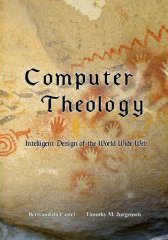PRESS
COMPUTER THEOLOGY |
||||
|
infrastructure. Transcendent personal devices present to the network
different aspects of our person, be it that of financial agent, a contributor
to the work force, or other roles associated with specific identity
credentials. With our conventional life thus extended to computer networks, we
sit at the intersection of the physical and digital ecosystems we participate
in. We’ve seen how biometry can be associated with transcendent personal
devices to link them more closely to our physical selves. With advances in
biological and other digital circuitry, we can expect to become an even more
integrated part of the digital network ourselves, becoming in a sense our own
transcendent personal devices. This will increase the integration of our
physical, social and digital ecosystems and will also create new opportunities
for asymmetries. As the Internet
and the Web thus grow in power through their connectivity and capabilities, we
can expect an ever increasing clamor from existing social ecosystems to exert
greater control over Internet and Web facilities. The Internet as it originally
emerged constituted an extension of the physical ecosystem into the digital
realm. Social ecosystems seek to establish some level of subjective influence
over the physical ecosystem. So, it is not surprising that existing social
orders seek to put their imprint on the facilities of the Internet. Some rail
against unfettered access without any societal controls on either access or
content. Others are concerned with protecting the individual against communal
intrusions. Evolutionary processes will determine whether these threats to the
existing Internet bring good or ill. One asymmetry we perceive with the
concerns involved is the attempt to deal with these issues through existing
social ecosystems’ mechanisms, all of which exist within their own independently
derived trust infrastructures. In that perspective, the only way such attempts can
succeed is by attacking the efficacy of the Internet itself. In other words,
the rules of engagement then revert to the physical ecosystem; if the Internet
cannot be controlled, it must be destroyed. An alternative is the establishment
of new trust infrastructures fit for the expanded social ecosystems of
integrated physical and digital worlds. We hope that this book will help in the
intelligent design of such a computer theology. As we said at the very beginning, we will continue our journey until we come to the end. Then, we will stop.
|
||||
|
||||
© Midori Press, LLC, 2008. All rights reserved for all countries. (Inquiries) The contents of ComputerTheology: Intelligent Design of the World Wide Web are presented for the sole purpose of on-line reading to allow the reader to determine whether to purchase the book. Reproduction and other derivative works are expressly forbidden without the written consent of Midori Press. Legal deposit with the US Library of Congress 1-33735636, 2007.
|
ComputerTheology Intelligent Design of the World Wide Web Bertrand du Castel and Timothy M. Jurgensen Midori Press, Austin Texas 1st Edition 2008 (468 pp) ISBN 0-9801821-1-5 |
Book available at Midori Press (regular) |
